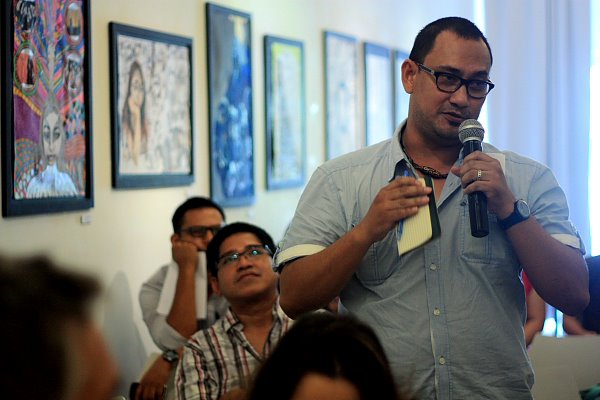An interview with Enrico Aditjondro
By: Alexandra Crosby
 Enrico Aditjondro – Goethe Institute Malaysia
Enrico Aditjondro – Goethe Institute Malaysia
Enrico has lived in Indonesia, West Papua, the United States, Australia and Timor-Leste. He started his journalism career in 1998 when he joined The Maritime Workers’ Journal in Sydney. He moved to Jakarta in 2000 and joined the Southeast Asia Press Alliance, while also traveling and working in Timor-Leste with UNESCO and the United Nations Transitional Administration in East Timor (UNTAET).
In 2005 he co-founded and was managing editor for Paras Indonesia, which became one of the country’s leading bilingual social-political websites. He has worked for the United Nations’ Food and Agriculture Organization (FAO), The International News Safety Institute, Transparency International-Indonesia, and EngageMedia.
He is currently working in West Papua as a producer for Big Stories Small Towns, an evolving multiplatform documentary about love, humour, family and belonging.
Thanks to the Cosmopolitan magazine, a lot of folks in Indonesia seem to identify ‘cosmopolitanism’ with glamour, celebrities and trends, rather than any kind of intellectualism. Perhaps the closest Indonesian term would be ‘gaul’ or being ‘anak gaul’ – somebody who seems to always be in touch on social media, knows what’s going on (at least from the headlines on twitter), and knows a lot of important people. The idea is that anak gaul can get along well with most folks, and that can be on a global scale.
Who are some Indonesian cosmopolitans that inspire you?
Well, I grew up in a cosmopolitan family where we travelled constantly and lived in many different places. That was just the way it was since I was very small. So I suppose my parents were the first inspiration – my dad would introduce cool new cultures, while my mum’s way of making me able to adapt easily in a new place was by saying to me, ‘make this new home the best home you’ve ever lived in’. That was how we lived I suppose.
In recent times, I’m always inspired by what my friend Ukke has done. She’s a Sundanese woman, anthropology graduate, and used to work for The Body Shop’s social awareness initiatives. We worked together on various climate change campaigns. She’s Muslim, married to a Batak Christian, and they each practice their own religions. They have a daughter who was raised as a moderate Muslim. But Ukke from early on told her daughter she was free to choose any religion she wants once she understands their concepts. Her daughter is now home-schooled, where the teachers include top filmmakers, artists, historians, journalists and activists – all of whom are good friends of Ukke and her husband. After years of working in the private sector, Ukke has now started Circa Handmade dolls with marginalised women and leads the Craft for Change movement – urging crafters to create and self-sustain. I think this is a kind of cosmopolitanism that goes ‘beyond’ the idea of religious tolerance.
Does leaving Indonesia make you feel less Indonesian? Does it make it harder to go back?
Because I moved around so much from an early age I’m not quite sure what ‘feeling Indonesian’ really is. I don’t see territorial borders as a way to differentiate people and culture. As I learn from meeting people and listening to their stories, the troubles people suffer, the joy people feel and the challenges they face are all unique but similar. As for food, you can find croissant, nasi goreng or sushi anywhere nowadays.
What you could miss though, is your own language and how people accept you. I wouldn’t want to feel like a foreigner all the time. Even though Jakarta is hardly an ideal home, at least I’m just another guy on the street; I can be anonymous. (Disclaimer: I’ve never lived for a long time in a place where none of Indonesian, Malay or English was the main language. So, we’ll see how I would feel when I’m living in Yangon next time, perhaps.)
I was thankful that my mother taught me to adapt easily by embracing the newest port of call as the best home. But to be honest, I haven’t found what ‘home’ is because there’s always something you miss elsewhere. So nope, my personal challenge is actually staying put, rather than moving on or going back.
What kind of relationships do you have ‘outside Indonesia’?
Having lived and worked over the years in West Papua, the United States, Australia and Timor-Leste, those places rope me back in continuously. I’m based in Jakarta now, but at the time of writing I’m punching the keyboard from Waigeo, the biggest island in Raja Ampat, West Papua. I’m currently making Waisai, the capital of Raja Ampat, my temporary base while I make a series of videos about the people of these islands of paradise. The videos will be distributed mainly via the Big Stories, Small Towns project website (www.bigstories.com.au), a video initiative by a group of Australians.
And before this trip, I spent the past four years working for EngageMedia (www.engagemedia.org) as its Southeast Asia Editor. For the past couple of years, I’ve been guest lecturing via Skype for Ithaca College’s Video and Environment class. And next year, hopefully, I’ll start a Timor-Leste documentary. So yes, after living and working in a certain place, I tend to go back for the aftertaste.
How do you think being cosmopolitan is different now from previous generations?
I love the internet. After a couple of weeks island hopping, I began to miss googling silly things like “jokes on Abbott’s no apology”. However, a week ago I was arguing with a person from Jakarta who was visiting Raja Ampat over information about the islands. She was convinced about the accommodation, prices and schedules on one of the islands. I told her, life wasn’t that simple in Raja Ampat – where there are no internet cafes and not a day goes by without a power outage. Folks here have to worry about fuel supply before thinking about updating information on their websites.
So yes, the digital natives (and immigrants) now have easier access to information that can trigger their interest in different cultures and people. Via video sites, land rights activists in Cambodia can watch and learn that their brothers and sisters in West Papua and Kalimantan are also facing similar problems, and therefore a solidarity movement can be built. But being an Indonesian cosmopolitan in the online world must also entail the understanding that unlike how the mainstream media portray them, people, language and culture are not as uniform as they are on screen in the Jakarta TV programs. People don’t speak the same Jakarta dialect, wear the same type of clothes nor do they all need to eat rice.
To work for an international/ transnational NGO, do you have to be cosmopolitan?
You have to appreciate differences, but at the same time you must not succumb to other cultures. Sometimes NGO workers just follow the culture of where the organisation was founded without considering the benefit of their own background. Be proud of where you’re from, but appreciate others too. Seems like common sense, but it’s so often forgotten.
Is this harder (or even possible) if you are not educated?
There are a lot of individuals who have made it big in international/ transnational NGOs even without a top education. Most of these people though have lived side by side with different cultures. In some cases, they were forced to.
A Papuan filmmaker recently managed to screen his videos at the Australian Parliament, watched by a handful of senators. The 32 year-old has only just started going to university. He barely speaks English. But, being brought up in a family of mixed tribes and hanging out with people of mixed religions, he later also found another way to express his opinion through videos. Since then, it opened him up to the wider audience. His short video about a school with no teachers in Keerom, Jayapura, has now been seen by people all over the world – including a teacher in Surabaya, East Java, who decided she wanted to volunteer and teach in that school.
Is cosmopolitanism just another word for globalisation and westernisation?
I hope not. Several years ago I wouldn’t have thought that kids in Jakarta would recognise the names of K-pop singers more than the western boy bands.
Alexandra Crosby (ali@alimander.com) met Enrico (aditjondro@gmail.com) while they were both working for EngageMedia (2009-2012). This interview was done over email, online chatting and phone calls.











